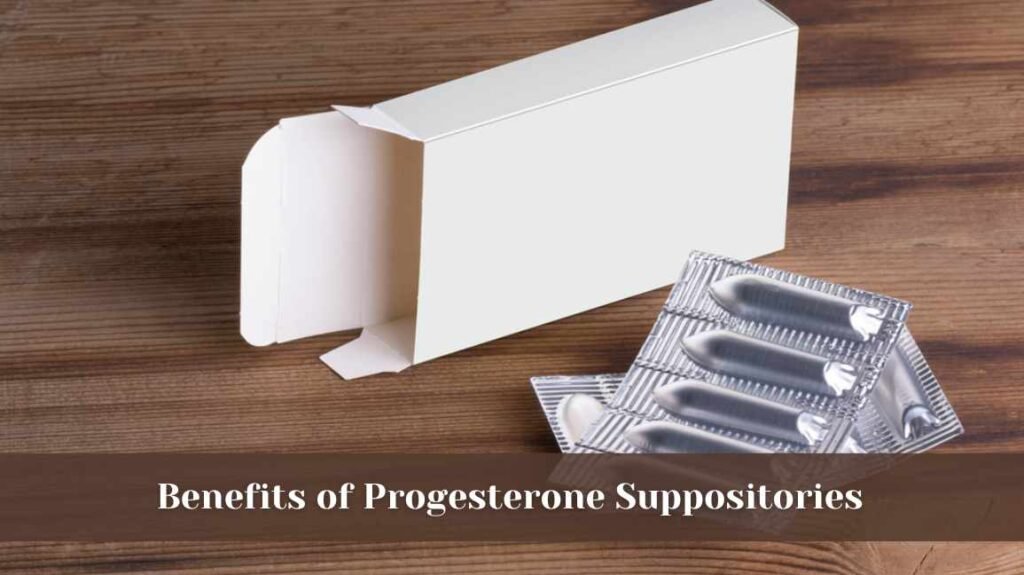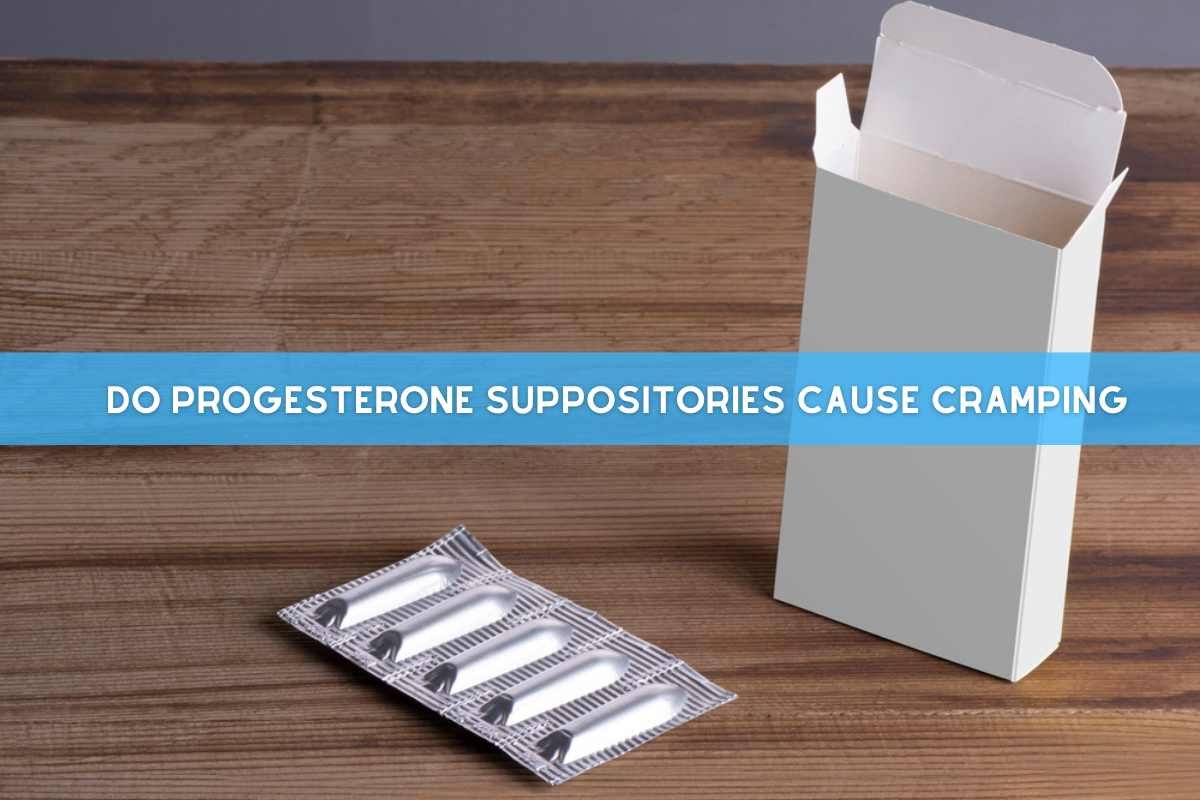Progesterone suppositories are commonly prescribed to women in certain situations, as part of fertility treatments or to support early pregnancy.
Even though they are widely used, patients often have questions about possible side effects. One common question is whether these suppositories can cause cramping. This is an important query as cramping can be concerning, particularly in early pregnancy.
In this article, we explore the possible side effects of progesterone suppositories, specifically whether they can cause cramping. We also aim to offer support and clear information for women going through fertility treatments or early pregnancy.
What Are The Progesterone Suppositories?
Progesterone suppositories is also known as endometrin or crinone are a type of hormonal medication often used in fertility treatments or to support the early stages of pregnancy.
They are inserted vaginally and absorbed directly into the lining of the uterus, providing a localized effect instead of affecting the whole body, which can reduce certain side effects.
Progesterone is a hormone that occurs naturally in the body. It is important for preparing the uterus for pregnancy and keeping it healthy. Some women who use progesterone suppositories may feel cramping as a side effect.
It’s important to note, however, that this is not a universal side effect and many women use these suppositories without any discomfort. The cramping may happen because the body is getting used to higher levels of progesterone or because of putting the suppository inside.
Progesterone vaginal side effects
If you experience signs of an allergic reaction like hives, trouble breathing, or swelling of your face, lips, tongue, or throat, seek immediate medical assistance.
Progesterone suppositories typically don’t cause severe side effects. However, some women may experience mild to moderate side effects, which include:
- mild pelvic discomfort or cramping
- breast tenderness or swelling
- bloating, swelling in your hands or feet
- dizziness or drowsiness
- vaginal itching, burning, or discharge
- feeling of nausea or vomiting
- headaches
- changes in mood or libido
Serious Side Effects
Though rare, progesterone suppositories can sometimes cause serious side effects.If you experience any of the following symptoms, it’s crucial to contact a healthcare provider right away:
- abnormal vaginal bleeding
- severe abdominal pain or persistent cramping
- unusual or severe mood swings or depression
- yellowing of the skin or eyes (jaundice)
- persistent nausea or vomiting
- chest pain or shortness of breath
- swelling of hands, ankles, or feet
- severe headaches or migraines
- dark urine or unusually colored stools
Keep in mind, that this list doesn’t cover all possible side effects, and there may be others. Make sure to consult your healthcare provider to confirm if this information applies to your specific situation.
Also Read: Progesterone Suppositories Side Effects vs Pregnancy Symptoms
Benefits of Progesterone Suppositories

These suppositories can help maintain and support the uterine lining, which is necessary for the successful implantation and growth of a fertilized egg.
For women with a history of recurrent miscarriages or whose progesterone levels are low, supplementation with progesterone suppositories can significantly increase the chances of a successful pregnancy.
Moreover, since these suppositories are applied locally, they minimize the widespread effects of progesterone which results in fewer side effects compared to other methods of administration.
However, it’s important to note that like all medications, progesterone suppositories should be used under the guidance of a medical professional.
If you’re thinking about using progesterone suppositories for fertility or during pregnancy, talk to your doctor about the pros and cons. This will help you get the right and safe treatment for your needs.
Do progesterone suppositories cause cramping?
Yes, progesterone suppositories can potentially cause cramping in some women, although it’s not a universal side effect.
The cramping can arise when the body gets used to higher levels of progesterone or in response to inserting the suppository.
This cramping is generally not a cause for concern and is often due to the body adjusting to the increased levels of the hormone. The application of the suppository can also cause temporary discomfort or cramping.
However, if the cramping is severe or persistent, this may be a sign of a more serious issue and should be immediately reported to a healthcare provider. Sometimes, severe cramping can be a sign of a more serious problem with progesterone suppositories, like an allergic reaction or an issue with the pregnancy.
Remember, while progesterone suppositories can cause cramping in some women, many others use them without experiencing this side effect.
It’s important to have open discussions with your healthcare provider about any discomfort or concerns you may experience while using progesterone suppositories.
Also Read: Does wegovy affect menstrual cycle? Uncover the Truth
Does progesterone cause cramping in early pregnancy?
In early pregnancy, progesterone levels naturally rise and this increase can sometimes cause mild cramping. According to the Medical News Today, this cramping is usually quite mild and nothing to be worried about.
However, if the cramping becomes severe, or is accompanied by other symptoms like bleeding or severe pelvic pain. This could be a sign of a more serious problem, such as an ectopic pregnancy or miscarriage, and should be immediately reported to your healthcare provider.
Progesterone is important for a healthy pregnancy. It helps the uterus get ready for the fertilized egg and keeps the uterine lining during pregnancy. However, artificial supplementation of progesterone in the case of progesterone suppositories – can cause side effects, including cramping, in some women.
It’s worth noting that not all women experience cramping due to progesterone in early pregnancy. Each individual’s response to hormonal changes and treatments is unique. If you have concerns about cramping or any other symptoms, it’s best to consult your healthcare provider.
How should I use progesterone vaginal?
To use progesterone vaginal suppositories, carefully follow the instructions provided by your doctor. Here are some general steps you might need to follow.
Always wash your hands thoroughly before handling the suppository as this can help prevent infection.
You may find it easier to lie down or stand with one leg raised while inserting the suppository. Insert it deep into the vagina to ensure it is appropriately placed for absorption.
Progesterone vaginal is given for a short period, usually 6 to 12 days. If used during fertility treatment, it may be given for up to 12 weeks into a pregnancy. Make sure to follow your doctor’s instructions carefully for the right dosage.
If you’re using an applicator, load the progesterone suppository into the applicator following product instructions, then insert the applicator into your vagina and push the plunger to release the medication.
After application, wash the applicator with warm soapy water and let it air dry. Dispose of the applicator if it’s meant for single use.
Try to avoid going to the bathroom for a few hours after inserting the suppository to ensure the medication has time to be absorbed.
It’s common to have vaginal discharge for a few days after using this medicine. If you’re worried about any discharge, talk to your doctor.
Remember, it’s crucial to use this medication at the same time each day and not to skip any doses. If you miss a dose, take it as soon as you remember unless it’s close to the time of your next dose.
Keep progesterone vaginal inserts or gel at room temperature, away from moisture, heat, and light.
Progesterone vaginal suppositories should be stored in the fridge. Just follow the instructions that come with your medication.
What should I avoid while using progesterone vaginal?
You should avoid sexual intercourse until the suppository has completely dissolved, usually within 2-3 hours of insertion. This is to ensure the medication is fully absorbed and to prevent it from being dislodged.
Avoid using any other vaginal medicine within 6 hours before or after applying progesterone vaginal gel. Stick to the vaginal products recommended by your doctor.
Moreover, avoid using other vaginal products like tampons, douches, or other medications unless explicitly instructed by a provider, as they can interfere with the absorption of progesterone.
Be cautious when driving or doing anything that requires you to stay alert.
Additionally, it’s recommended to avoid alcohol, caffeine, and illicit substances as these can exacerbate side effects or interact with the medication. Always talk with your doctor about any concerns or queries you may have while using progesterone vaginal suppositories.
Factors that may contribute to cramping while using progesterone suppositories
Several factors can contribute to cramping when using progesterone suppositories.
One of the most common causes is the body adjusting to increase levels of progesterone. The introduction of this hormone can cause the uterus to contract slightly, leading to feelings of cramping.
Secondly, the process of inserting the suppository can physically stimulate the cervix or the walls of the vagina, causing transient discomfort or cramping. It’s important to note that people can have varied responses to progesterone. Some women may experience more side effects than others, even if they are taking the same dose.
Underlying gynecological conditions could also make a person more prone to cramping. For instance, conditions like endometriosis or uterine fibroids can cause a woman to experience more intense cramping when using progesterone suppositories.
Lastly, in rare cases, severe cramping could be a sign of an allergic reaction to the suppository itself. If cramping is severe, persistent, or accompanied by other unusual symptoms, it’s essential to seek medical attention immediately.
Managing Cramping and Discomfort
Here are some tips to help manage cramping and discomfort while using progesterone vaginal suppositories:
- Use a heating pad or hot water bottle on the lower abdomen to ease cramping.
- Take a warm bath to relax tense muscles and reduce cramping.
- Practice gentle exercises like stretching, yoga, or walking to alleviate discomfort.
- Drink plenty of water to stay hydrated and flush out any toxins that could contribute to cramping.
- Consider using over-the-counter pain medication like ibuprofen or acetaminophen if recommended by your doctor.
Avoid taking aspirin, as it can increase the risk of bleeding.
- Try relaxation techniques like deep breathing or meditation to manage stress and reduce cramping.
Conclusion
In conclusion, using progesterone vaginal suppositories is a significant part of fertility treatments and managing certain gynecological conditions. Cramping, while a common side effect, can be managed with a combination of warmth, gentle exercise, hydration, approved pain medication, and relaxation techniques. Always remember to consult your provider if you experience severe or persistent discomfort, or if you have any concerns about your symptoms.
FAQ
What happens if I miss a dose?
If you miss a dose, it’s important to take it as soon as you remember. However, if it’s close to the time of your next dose, skip the missed dose and continue with your regular dosing schedule. Do not take a double dose to make up for a missed one. If you’re unsure, consult your healthcare provider to understand the best course of action.
Can progesterone suppository cause stomach pain?
Yes, while not common, progesterone suppositories may cause stomach pain in some women. This could be due to a bodily reaction to increased levels of progesterone or a side effect of the medication. If stomach pain persists or becomes severe, it’s important to contact your healthcare provider for advice.
What happens if I overdose?
If you accidentally overdose on progesterone suppositories, seek immediate medical attention or contact your local poison control center.
Can progesterone suppositories cause lower back pain?
Yes, progesterone suppositories can cause lower back pain in some women. This is because the hormone progesterone may cause minor contractions in the uterus which can be felt as lower back pain or cramping. However, if the back pain is severe, continuous, or is accompanied by other unusual symptoms, it is advised to seek medical help immediately.
Hello Friends!
My name is Ahmad, reading books and gaining knowledge about Health, skin and their conditions is my passion and I am here to share my knowledge and experience with you. I hope it’s very helpful for you.
Thank you very much.
